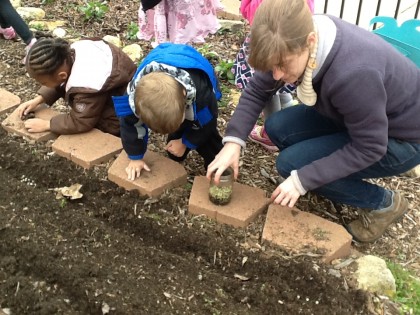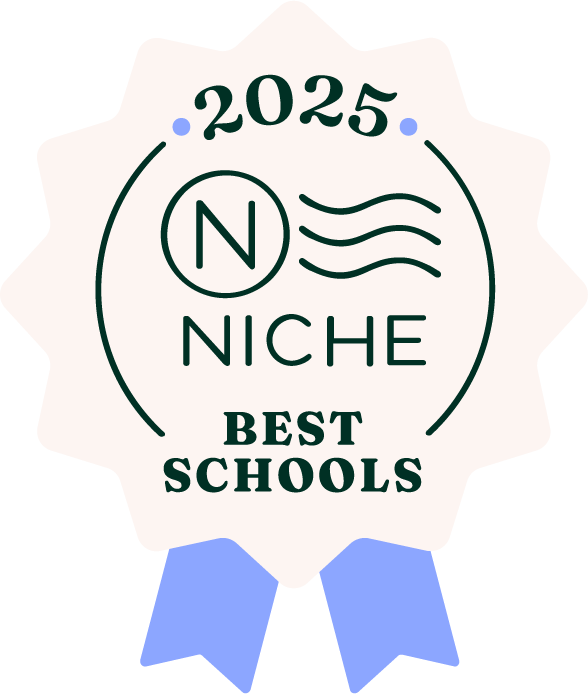At Greensboro Montessori School, children and their families share in a stimulating and nurturing educational experience, built upon the core values of respect, independence, and responsibility. Teachers tailor the classroom experience to each child’s developmental needs, allowing the child to pace herself and simultaneously discover the joy of learning as its own reward. Guided by the vision and wisdom of Dr. Maria Montessori, a pioneer in early child development, and supported by a committed community, the Greensboro Montessori School has developed a rich history of nurturing creative, eager learners. Today the school serves 250 children in a comprehensive program for toddlers through junior high.
Dr. Maria Montessori (1879-1952) was a pioneer in early childhood development and the originator of the Montessori philosophy. She was twice nominated for the Nobel Peace Prize. Dr. Montessori believed in “following the child:” teaching the child what he or she is ready to learn when he or she is developmentally ready to learn it. Academic expectations of a child are based on ability rather than age because children develop according to their own unique timetables for growth. Students are expected to work toward mastery of a skill or concept rather than to achieve a passing grade on a test. Teachers monitor the individual progress of each student on a daily basis. Often mastery is determined when a child is able to apply a given skill or concept in a project or independent assignment and do so successfully. Children can also demonstrate mastery by teaching a lesson to another classmate or giving a formal presentation to a group.

For over 100 years, Montessori classrooms have been organized around a two or three year developmental cycle of learning, designed to respond to the needs and characteristics of each specific state of a child’s growth, which non-Montessori educators today call differentiated education. The Toddler program accommodates children 18 months to 3 years of age. The Primary program is for children 3 to 6 years of age. Following the “kindergarten year” in the Primary program, children advance to the Lower Elementary program designed for student’s ages 6 to 9 years of age (first to third grades). Children ages 9 to 12 are part of the Upper Elementary program (fourth to sixth grades). The child ends his or her journey in Junior High where the program is integrated with 12 to 15 year olds (seventh to ninth grades) and addresses the specific cognitive, emotional and developmental needs of this age group. As children advance through each level or school, older children become role models for the younger children. Teachers set higher expectations for the older children so that they understand the importance of modeling respectful behavior and act as role models for their classmates.
Learn more about Montessori education from the American Montessori Society: What is Montessori Education
To provide the best personalized and hands-on educational experience for our students — one that empowers them to positively impact the world.
We nurture and challenge students to develop the skills and courage they need to unleash their full potential.
The Greensboro Montessori School is committed to Montessori philosophy and practice. For almost 100 years, Montessori educators have presented a rigorous academic education tailored to prepare children for success in their various cultures. Yet, academics is only one part of the curriculum. Maria Montessori believed that children should be nurtured to develop according to their individual needs and timetables for growth. She also believed that if children were then guided as they explored awareness of themselves, their communities, and the natural world, they would develop into peaceful, fully productive adults who could benefit and steward the world with unprecedented success. At GMS we believe:
- Children are born with the natural desire to learn.
- Learning is a lifelong process.
- Learning best occurs when the curriculum reflects that the developmental stages of children are fleeting, delicate, irreplaceable, and age-sensitive.
- Learning takes place when children feel safe enough to take risks with new ideas and concepts.
- The primary role of the teacher is to prepare the environment, observe the children, and guide them according to their developmental needs.
- With teachers as role models, children achieve their highest potential when they are trusted, allowed to be responsible, and given opportunities to make appropriate choices.
- Children develop toward their own potential at their own pace, and deserve a learning environment that nurtures and respects their individual strengths and
interests. - Children learn by doing and from their peers. Hands on experiences and multi-age groupings have a significant impact by making the learning process relevant to their lives.
- All children deserve an education that respects them as people and allows them to learn by experience.
- Children learn best when academic subject areas are integrated in a way that reflects the broader world.
- Challenging academic work is critically important to the growth of all children.
- Academic development is integrated with the rest of a child’s development, including social, emotional, spiritual, and physical development.
- Technology is a tool that connects people, strengthens communications, and its use is essential to prepare students to meet current and future demands.
- Being conversant in more than one language will be vital to our children’s personal and professional success.
- Creativity and self-expression are a valuable part of a strong academic program.
- Learning is an indoor and outdoor activity. It is vital for children to have plenty of opportunities to work and play outdoors.
- Through service to the community, children learn the value and responsibility of being productive members of society.
- Outdoor and environmental education are important for children to learn how to steward the environment.
- Children who are involved in governing the classroom and finding peaceful resolutions to conflicts from an early age are likely to develop self-discipline.
- Welcoming people of different cultures, religions, ethnic origins, family constellations, sexual orientations, economic status, customs, languages, and heritages creates an atmosphere of awareness, understanding, respect, and peace.
- When a parent understands and supports Montessori philosophy, the child’s educational experience is enhanced.
- The school must maintain open and ongoing communication with parents in order to best meet the academic, social and emotional needs of the students.
- Students, teachers, parents, administrators and trustees must work together to ensure student success, to enhance the quality of education, to preserve the school’s mission, and to build the school’s future.
- The commitment to maintaining Montessori philosophy and continuing school improvements ensures that our students have the greatest opportunity to become confident, self-directed, life-long learners in a rapidly changing world.
- Sharing the Montessori philosophy can benefit the greater community.


